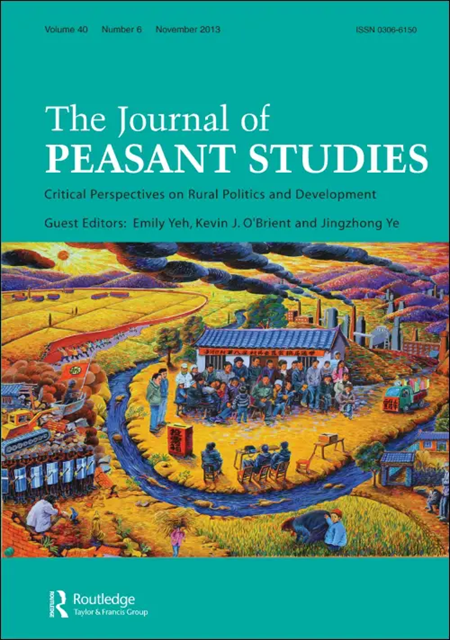The ‘state’ of food sovereignty in Latin America: political projects and alternative pathways in Venezuela, Ecuador and Bolivia
IF 4.8
1区 社会学
Q1 ANTHROPOLOGY
引用次数: 112
Abstract
The concept of food sovereignty has been enshrined in the constitutions of a number of countries around the world without any clear consensus around what state-sponsored ‘food sovereignty’ might entail. At the forefront of this movement are the countries of the so-called ‘pink tide’ of Latin America – chiefly Venezuela, Ecuador and Bolivia. This paper examines how state commitments to food sovereignty have been put into practice in these three countries, asking if and how efforts by the state contribute to significant transformation or if they simply serve the political purposes of elites. Understanding the state as a complex arena of class struggle, we suggest that state efforts around food sovereignty open up new political spaces in an ongoing struggle around control over food systems at different scales. Embedded in food sovereignty is a contradictory notion of sovereignty, requiring simultaneously a strong developmentalist state and the redistribution of power to facilitate direct control over food systems in ways that may threaten the state. State-society relations, particularly across scales, are therefore a central problematic of food sovereignty projects.拉丁美洲粮食主权的“状态”:委内瑞拉、厄瓜多尔和玻利维亚的政治项目和替代途径
世界上许多国家的宪法都明文规定了粮食主权的概念,但对于国家支持的“粮食主权”可能意味着什么,却没有达成任何明确的共识。在这场运动的前沿是所谓的“粉红潮”的拉丁美洲国家-主要是委内瑞拉,厄瓜多尔和玻利维亚。本文考察了国家对粮食主权的承诺是如何在这三个国家付诸实践的,询问国家的努力是否以及如何有助于重大变革,或者它们是否只是服务于精英的政治目的。将国家理解为阶级斗争的复杂舞台,我们建议国家围绕粮食主权的努力在围绕不同规模的粮食系统控制的持续斗争中开辟了新的政治空间。在粮食主权中嵌入了一个相互矛盾的主权概念,同时要求一个强大的发展主义国家和权力的再分配,以促进以可能威胁国家的方式对粮食系统的直接控制。因此,国家-社会关系,特别是跨尺度的关系,是粮食主权项目的一个核心问题。
本文章由计算机程序翻译,如有差异,请以英文原文为准。
求助全文
约1分钟内获得全文
求助全文
来源期刊

Journal of Peasant Studies
Multiple-
CiteScore
10.50
自引率
17.60%
发文量
99
期刊介绍:
A leading journal in the field of rural politics and development, The Journal of Peasant Studies (JPS) provokes and promotes critical thinking about social structures, institutions, actors and processes of change in and in relation to the rural world. It fosters inquiry into how agrarian power relations between classes and other social groups are created, understood, contested and transformed. JPS pays special attention to questions of ‘agency’ of marginalized groups in agrarian societies, particularly their autonomy and capacity to interpret – and change – their conditions.
 求助内容:
求助内容: 应助结果提醒方式:
应助结果提醒方式:


